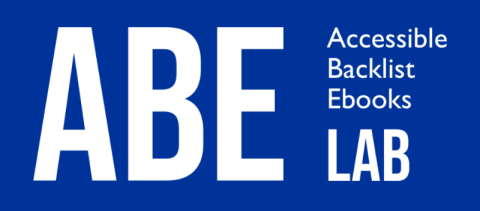In the context of the European Accessibility Act publishers are producing more and more accessible ebooks. But many titles were produced before and are still on sale, this is what we call the backlist and it is particularly important because the sales generated by those books can be very low but they remain on sale thanks to the low cost maintenance of digital warehouses. Making backlists accessible can quickly become expensive and challenging when millions of ebooks are concerned.
ABELAB is an 18-month research and development project, starting in January 2023 and ending in June 2024. It is funded by Creative Europe and three partners: The European Digital Reading Laboratory (EDRLab), Fondazione Libri Italiani Accessibili (LIA) and the national library of the Netherlands (KB).
The main objective is to provide guidelines to European publishers for boosting the conversion of their currently on sale ebooks into accessible formats. A complete description of the project can be found on the abelab webpage.
Project partners are experts in various fields: technology for EDRLab, accessibility for Fondazione LIA and public services for the National Library of the Netherlands. Their knowledge and experience of different markets and contexts (France, Italy and the Netherlands and more generally European) will also be useful for the success of the project.
Day by day
The first 6 months of the project have been dedicated to collecting data, establishing a classification system, communicating with and requesting sample files from publishers. Despite difficulties related to duplications and data consistency, we’ve reached more than our baselines with 22 countries providing general data and 5 countries providing detailed data. A first view of the composition of the European Ebook backlist is available on the project website and has been commented on at LIA’s Accessibility Camp in Madrid and during the Digital Publishing Summit (starting today 19 June until 23 June). It shows a European ebook backlist of 3.5 million titles, more than the half of them concentrated in France and Germany. Segmentations by categories, formats and dates reveal large disparities between markets, enlightening that different approaches will have to be deployed to address different situations.
We have collected more than 200 files from 5 countries and have an agreement with Beletrina, DeMarque and Hachette to obtain data from their own ebook warehouses. They’re expertise helps us to identify points of control and establish a granular classification methodology. We are developing a set of tests which we’ll detail in a gap analysis document released by fall 2023.
Collaborations
The project is possible thanks to the welcome collaboration of many organisations across the book production and distribution chain. A list of contributors will be available in the reports.
14 entities responsible for aggregation and distribution of book metadata provided us with data for 18 countries. Even if difficulties still exist to align data from different sources, the day to day work of those organisations made our work possible.
More than 20 publishers from 5 countries have provided a selection of 210 files representing the diversity of the production. Meeting with each of them has been rich discovery of the elements to consider within the project and we hope to provide them with our first global test results soon. We’ll be happy to meet more publishers as the industry is made of diversity and we aim at giving a picture as accurate as possible in our time frame.
We are now establishing partnerships with providers of conversion tools under free, opensource, public and in-house licences. Our hope is to come up with an estimate of global costs including training, analysis, conversion and reinjection of the updated file in the distributor systems and marketplaces. No tool will be named in the public report, except in the partnership section and we’ll provide a personalised report to the tool owner.
Next
We’ll be busy playing with remediation to elaborate a grid of needs and solutions and we expect to give our next announcements by December 2023 and final study by June 2024.
All news and events will be published on the abelab website and announced by partners newsletter. The project team can be reached at contact@abelab.eu. We look forward to reading your feedback!

